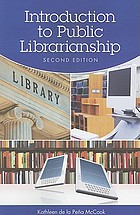Second Edition, Kathleen de la Peña McCook
Neal-Schuman Publishers


1
The Landscape of Public Libraries in the Twenty-First Century.
The public library is an excellent model of government at its best. A locally
controlled public good, it serves every individual freely, in as much
or as little depth as he or she wants.
—John N. Berry III, “A Model for the Public Sector,” 2001.
2
Brahmins, Bequests, and Determined Women: The Beginnings to 1918
And yet there can be no doubt that such reading [for the diffusion ofknowledge] ought to be furnished to all, as a matter of public policy and duty, on the same principle that we furnish free education, and in fact, as a part, and a most important part, of the education of all.
—Report of the Trustees of the Public Library to the City of Boston, 1852.
3
Public Library Growth and Values:1918–Today
At a time when our public is challenged on multiple fronts, we need to recommit
ourselves to the ideal of providing equal access to everyone, anywhere, anytime, and in any format. . . . By finally embracing equity of access we will be affirming our core values, recognizing realities, and assuring our future.
—Carla D. Hayden, ALA President, 2003–2004.
4
Statistics, Standards, Planning,Results, and Quality of Life
This book can change the course of the Public Library Movement in North America. In particular, it can hasten the day when there will be no millions without good local public library service. But the book will not do it unaided. From here on the success of this planning effort will rest primarily
with the state library organizations and library extension agencies.
—Carl H. Milam, executive secretary, American Library Association,foreword to A National Plan for Public Library Service (1948).
5
5
Organization, Law, Advocacy,Funding, and Politics
We who believe in the democratic mission of libraries must speak up and fight for information equity for all. Otherwise, we will endanger our most precious rights in a democratic society—the rights of free speech, inquiry, and self-governance.
—Nancy C. Kranich, ALA President 2000–2001,
in “Libraries, the New Media, and the Political Process.”
6
Administration and Staffing
Each public library must have a regular, paid, qualified staff of one or more persons, including a properly certified library director who is responsible to a library board. The public library staff should project an image of competence and friendliness to all members of the public. Public
library staff members should understand the service goals of the library, should be aware of all library policies, and should be well trained in the practices and procedures required by their individual positions.
—Wisconsin Public Library Standards (2010: 23).
7
Structure and Infrastructure
I have always imagined that Paradise will be a kind of library.
—Jorge Luis Borges, “Poema de los Dones,” from El Hacedor.
The library is a beacon of hope.
—Cedar Rapids, Iowa, city councilor Monica Vernon after the flood of 2008 (Berry, 2009).
8
Adult Services
Knowing which services public libraries provide for adults, including special groups of adults, and how these services are selected, is vital to determining and publicizing the valuable contributions public libraries make to their communities.
—A. Stephens
9
Youth Services
The child as reader, the child of the information age, the child in the community,
the global child, or the empowered child? Which child will we target as we plan and deliver library services in our communities? Better yet, can we strive to target them all?
—V. Walter, “The Children We Serve”
10
The Interconnective Nature of the Public Library
“Libraries Build Community,” means collaborating and forming partnerships
and alliances. To be effective, we need to work with other libraries,
groups, organizations and individuals who share our goals.
—Sarah Ann Long, ALA’s millennial president, 1999–2000,
A Place at the Table: Participating in Community Building, Foreword
11
Global Perspectives on Public Libraries
The public library, the local gateway to knowledge, provides a basic condition for lifelong learning, independent decisionmaking and cultural development of the individual and social groups.
—IFLA/UNESCO Public Library Manifesto, 1994
12
The Future of Public Libraries in the Twenty-first Century: Human Rights and Human Capabilities
Where, after all, do universal human rights begin? In small places, close to home—so close and so small that they cannot be seen on any maps of the world. Yet they are the world of the individual person; the neighborhood he lives in; the school or college he attends; the factory, farm, or office where he works. Such are the places where every man, woman, and
child seeks equal justice, equal opportunity, equal dignity without discrimination. Unless these rights have meaning there, they have little meaning anywhere. Without concerted citizen action to uphold them close to home, we shall look in vain for progress in the larger world.
—Eleanor Roosevelt, remarks at the United Nations, March 27, 1953